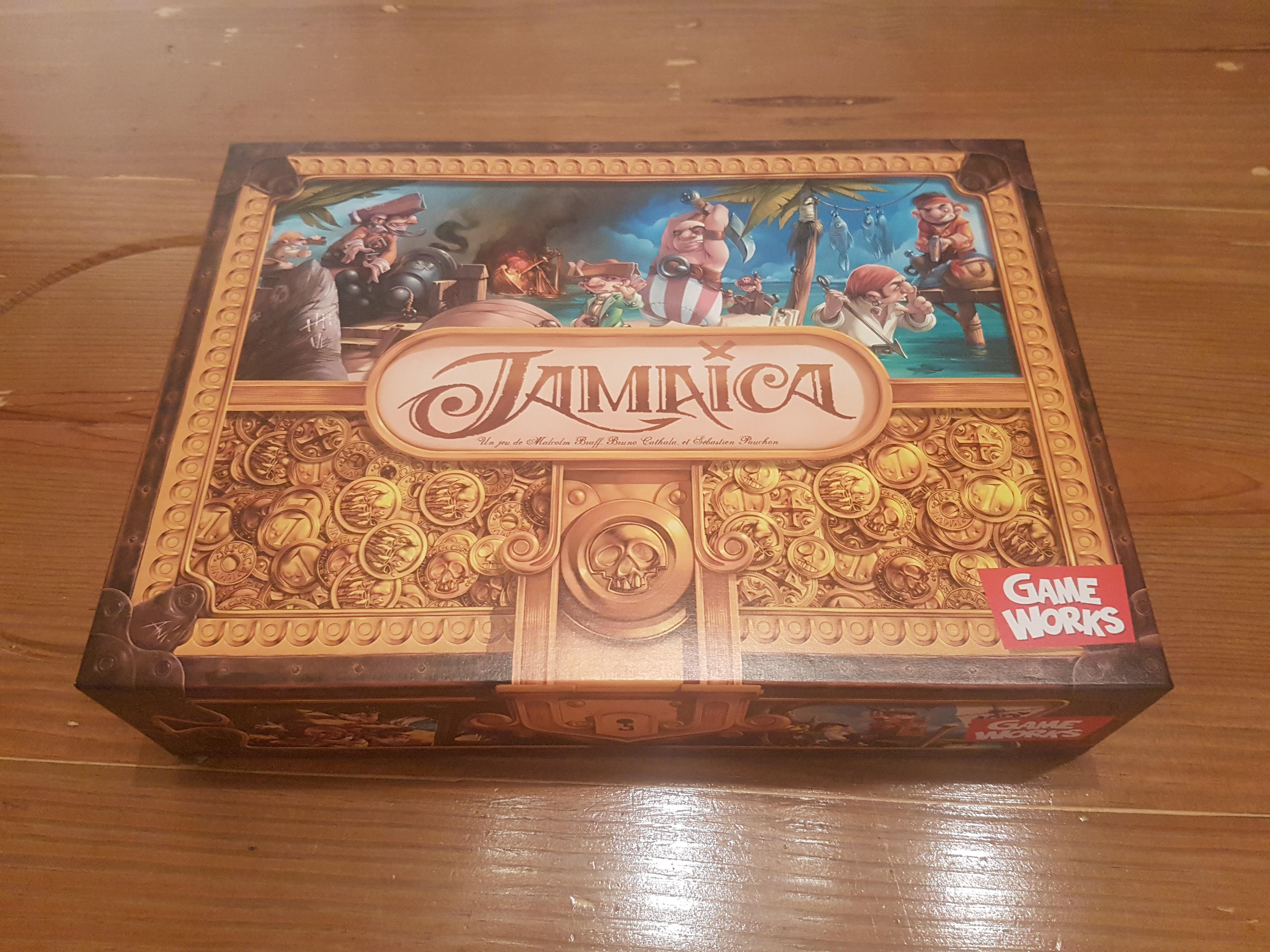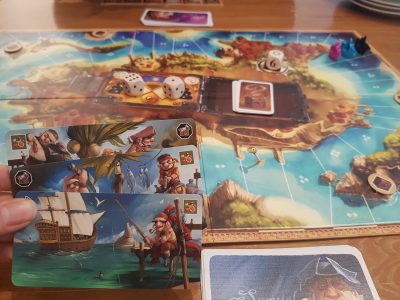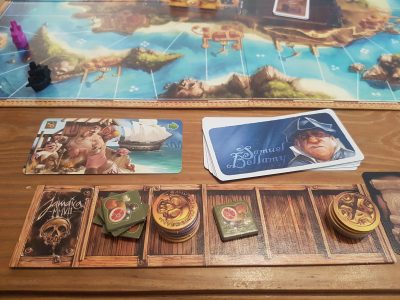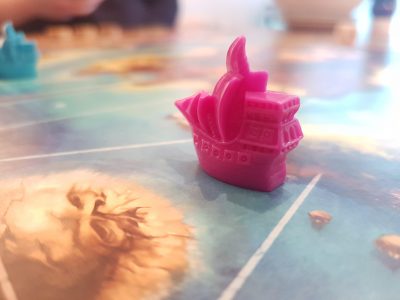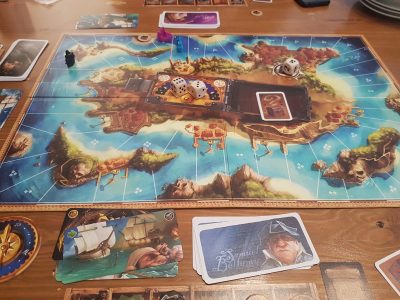Jamaica, originally released back in 2007, is a pirate themed racing game, which features dice rolling and card based actions. Designed by Malcolm Braff, Bruno Cathala and Sébastien Pauchon, and published by GameWorks, the game sees 2 – 6 players in a race around Jamaica. Getting around the island isn’t the only objective as players can grab loot on route and naturally fight over it as well. However, is this game a treasure or should the X on the map be veered away from? Let’s find out!
Players find themselves as pirate captains, taking part in the ‘Great Challenge’ race around Jamaica. After distributing player boards and cards, randomly selecting a starting captain, distributing starting money/food and placing treasure tokens onto the game board the game is ready to go. On a turn the player with the captain marker rolls the two dice and assigns each die to either day or night. How they assign the dice is completely up to them, though they will want to consult their hand of three cards, to know what’s best for them.
Each card features two symbols, where the top left symbol is the day action and top right is the night action. These can be one of five symbols: move forward, move backwards, gain gold, gain food or gain gunpowder. The cards have these symbols in different pairings. As an example, say the captain had rolled a 6 and 3. After looking at their cards they choose to assign the 3 to day and 6 to night. They then play a card with a “move forward” symbol in the top left and a “gold” symbol in the top right. That pirate would then move their ship 6 spaces forward, followed by collecting 6 gold.
Depending on where players land they may have to pay food or gold, as denoted on the spaces. If they are unable to pay the full amount they pay as much as they can and then move backwards until they reach a space they can afford. If a player lands on a pirate cave space they gain the top most treasure card. Some of these give bonus points, others will be cursed and lose the player points and four will give that player a special perk for the rest of the game. Finally, if a player lands on a space with another pirate combat ensues.
The attacker gets first choice over spending any gunpowder tokens then rolls the combat die, with values ranging from 2 to 10 with a single insta-win face. Then, the defender gets to spend gunpowder and must roll the dice. Insta-win rolls as the name suggests wins the combat automatically, otherwise it is whomever has the highest total, with ties won by the attacker. The winner can steal goods from one section of the loser’s cargo hold, steal a treasure from them or gift the loser a cursed treasure – making combat rather lucrative at times.
Whenever a player gains new cargo it must be put into a new cargo section, regardless of if a current cargo hold section already has that type of good. As a result, cargo holds fill up fast. Once full the player must choose to jettison goods to make room for new cargo. When playing for spaces you can pay from multiple sections of your cargo hold, with it being best to try to free a slot up if possible.
After the captain has moved the other players, in a clockwise direction, must play one of their three cards in their hand utilizing the day and night dice values. Once everyone has been players draw up to three cards, the captain marker gets passed onto the next player and play continues with the new captain rolling the dice. When a player reaches the Port Royal space the end of the game is triggered, with the current round finishing before points are calculated. To determine the winner, you combine points earnt or lost from the position on the board you finished on, earnt from gold, earnt from treasure chests and lost via cursed treasure.
There are no inherent ways to jump out in front or to fall behind but it does still happen. Once this split has happened there isn’t much in the rules to allow for catch up or to drag the player backwards. Spaces on the board do get progressively more expensive to land on but it is more than possible for only a couple of a full player count game to be ahead of the -5 point cut-off space on the board. Finishing the race in this situation is extremely powerful, scoring an additional 15 points. At the same time, those huge bonuses that treasures can offer makes them a viable strategy if the dice allow it.
Depending on the group and the dice rolls take-that actions, in terms of entering into combat, can play a large part of a game. In racing games, it is common place to have some sort of player interaction, often via blocking opportunities. However, in Jamaica this is ramped up by replacing blocking with combat. Having the potential to steal cargo is more aggressive than blocking and some simply don’t enjoy it. On the other hand, some have loved being able to open up their cannons on each other, it just depends on what your gaming group is into.
Players can affect the outcome of the die roll in combat by pre-paying with gunpowder tokens from their cargo hold. Nevertheless, I’ve seen players go into combat with no token, against someone with over 6 gunpowder tokens, and still come out victorious. This can lead some to get frustrated feeling like the game is against them. There is a plus side to this luck based mechanic: combat is over pretty quick it so keeps the game flowing and means those outside of combat aren’t left merely watching for too long.
The production quality of Jamaica is extremely high. The cards are oddly long in shape, and despite not having any major link to the actions, feature some pleasant artwork. Each character is based upon a real pirate with a short biography in the rulebook which is a nice touch. The board features some nice details, such as the pirate caves, the ports around Jamaica and the vibrant blue ocean that captures the Caribbean location perfectly. Players will be rolling some chunky dices for the day/night actions and combat, and moving some pretty neat boats around the island as player markers. Some of the tokens are a little thin, so you do have to make sure when passing them out the correct amount is given. Nevertheless, it all comes together to fit and support the piratey, seafaring race theme.
Jamaica’s interesting hull filling mechanic certainly sets the game apart from others, with players have to decide if it’s worth jettisoning different cargo for their new gains. While it adds to the fun it isn’t an overly intuitive system. Players will pick it up quickly, as it isn’t a difficult or confusing rule to follow, though players will automatically think when they receive gold coins they can store them with other coins. The best explanation is some extremely bad packaging used by pirates, though it is a little loose as explanations go. It works mechanically but it does make some question why thematically it’s a rule to begin with.
For a two-player game the rules poster suggests that players take it in turns to control a third AI like Ghost Ship. It does this as otherwise the interaction between two players is extremely minimal, though it can seem a little tedious controlling this non-player ship. It effectively is there patrolling up and down causing combat situations. This feels somewhat forced in to get interaction into the game; as a result, I’d only bring Jamaica to the table with 3 or more players. This way the interactions occur by player choice and there’s no need for the dummy player.
With actions played out via dice some will instantly be interested in or deterred from Jamaica. There is some choice, based on your hand of cards. Alas aside from the gunpowder tokens it can feel very much like players are at the mercy of the dice. Regardless of the speed combat, it feels like it has been included just to make the game more piratey and force interaction. To make matters worse it is incredibly disheartening to spend a cargo hold full of gunpowder tokens only for the defender to roll the instant success. If you don’t mind playing a casual racing game, that is dictated by dice then there is fun and enjoyment to be had. It can be fun as a group to laugh at one another as the dice gods punish you, though if you cannot laugh over misfortune you’ll want to give Jamaica a miss.
[Editor’s Note: Jamaica was provided to us by Asmodee UK for review purposes. The game is currently available on 365 Games for £28.99. It is also available from local UK board game stores, find your local store here]

